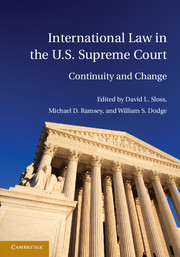Book contents
- Frontmatter
- Contents
- List of Contributors
- Table of Cases
- Acknowledgments
- Introduction
- PART I FROM THE FOUNDING TO THE CIVIL WAR
- PART II FROM THE CIVIL WAR TO THE TURN OF THE CENTURY
- PART III FROM THE TURN OF THE CENTURY TO WORLD WAR II
- PART IV FROM WORLD WAR II TO THE NEW MILLENNIUM
- PART V INTERNATIONAL LAW IN THE U.S. SUPREME COURT IN THE TWENTY-FIRST CENTURY
- V.A TREATIES AFTER 2000
- V.B CUSTOMARY INTERNATIONAL LAW AFTER 2000
- V.C INTERNATIONAL LAW AND CONSTITUTIONAL INTERPRETATION AFTER 2000
- V.D INTERNATIONAL LAW AND STATUTORY INTERPRETATION AFTER 2000
- V.E INTERNATIONAL LAW AND THE WAR ON TERROR
- Main Essay – The Supreme Court, the War on Terror, and the American Just War Constitutional Tradition
- Response Essay – Constitutional Resolve in a World Changed Utterly
- Response Essay – Judicial Imperialism and the War on Terror Cases
- VI CONCLUSION
- Index
- References
Response Essay – Judicial Imperialism and the War on Terror Cases
Published online by Cambridge University Press: 05 July 2011
- Frontmatter
- Contents
- List of Contributors
- Table of Cases
- Acknowledgments
- Introduction
- PART I FROM THE FOUNDING TO THE CIVIL WAR
- PART II FROM THE CIVIL WAR TO THE TURN OF THE CENTURY
- PART III FROM THE TURN OF THE CENTURY TO WORLD WAR II
- PART IV FROM WORLD WAR II TO THE NEW MILLENNIUM
- PART V INTERNATIONAL LAW IN THE U.S. SUPREME COURT IN THE TWENTY-FIRST CENTURY
- V.A TREATIES AFTER 2000
- V.B CUSTOMARY INTERNATIONAL LAW AFTER 2000
- V.C INTERNATIONAL LAW AND CONSTITUTIONAL INTERPRETATION AFTER 2000
- V.D INTERNATIONAL LAW AND STATUTORY INTERPRETATION AFTER 2000
- V.E INTERNATIONAL LAW AND THE WAR ON TERROR
- Main Essay – The Supreme Court, the War on Terror, and the American Just War Constitutional Tradition
- Response Essay – Constitutional Resolve in a World Changed Utterly
- Response Essay – Judicial Imperialism and the War on Terror Cases
- VI CONCLUSION
- Index
- References
Summary
Professor David Golove, in his usual insightful style, invites us to find in the history of international law in the Supreme Court “an active role for the judiciary in the development of the law of war and in ensuring executive compliance with its obligations.” That active role, he continues, supports the early-twenty-first-century Court's interventions in the war on terror, even though the decisions by which the Court intervened do not align comfortably with specific prior precedents and practices.
I cannot see in the Court's history what Professor Golove sees. True, American history in general, and some of the Court's cases, include broad gestures toward the importance of the laws of war. And true also, cases applying the laws of war – particularly adjudicating prize controversies – are common in the Court's early history. But I see the laws of war most often invoked interstitially or to expand rather than constrain war-fighting capacity. In few if any historical instances did the Court use the laws of war to second-guess the political branches' core war-fighting strategies.
Thus, I would put the point somewhat differently. Traditionally, developing war-fighting strategy has been the responsibility of the executive (and to some extent the legislative) branch. To a greater or lesser extent (depending on the period one examines) the executive and legislative branches were expected to pursue that responsibility subject to their understandings of the laws of war, and – at least at a rhetorical level – they generally did so.
- Type
- Chapter
- Information
- International Law in the U.S. Supreme Court , pp. 582 - 588Publisher: Cambridge University PressPrint publication year: 2011

